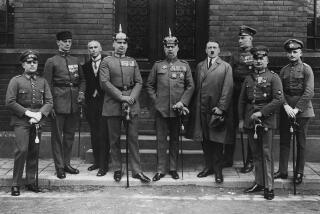Moshe Landau dies at 99; Israeli jurist presided over Adolf Eichmann trial
Reporting from Jerusalem — Respected Israeli jurist Moshe Landau, who fled Nazi Germany as a young man and later presided over the historic trial of captured war criminal Adolf Eichmann, died Sunday in Jerusalem after a heart attack. He was 99.
The former Israeli Supreme Court president was credited with guiding the fledgling nation through a deeply painful and ultimately cathartic tribunal after the 1961 capture and rendition of the fugitive German SS officer by Israeli spies in Argentina.
Landau’s rulings were instrumental in limiting government censorship and protecting civil rights, while his dry, no-nonsense style made him a standard-bearer of judicial calm and restraint.
Former Supreme Court President Aharon Barak called Landau a “guiding star,” while retired Supreme Court Justice Meir Shamgar said Landau was one of the “titans that shaped and established the law of the state of Israel.”
Landau died as Israel commemorates the 50th anniversary of the trial he presided over and on the eve of Holocaust Remembrance Day.
“The state of Israel will remember him as a role model for courageous leadership,” Israeli President Shimon Peres said.
Landau was born April 29, 1912, in what was Danzig, Germany, and is now Gdansk, Poland. After studying law at the University of London, he immigrated to Palestine and was admitted to the bar in 1937. He was named to Israel’s Supreme Court in 1953.
Images of the black-robed Landau questioning Eichmann in his glass booth are seared into the memories of many Israelis. In one of the trial’s most dramatic moments, Landau maintained a cool, unflappable demeanor after an Auschwitz concentration-camp survivor fainted on the witness stand and the courtroom erupted in commotion. Above the turmoil, Landau’s soft yet authoritative voice can be heard on archived footage, first calmly calling for “Quiet, quiet,” and then in a slightly louder admonishment, “Sit in your seats.”
Israeli historian and writer Tom Segev said Landau was committed to maintaining a sense of order and fairness during the trial, even if it meant he sometimes clashed with prosecutors or politicians who saw the trial as an opportunity to educate the world about the Holocaust and boost Israeli nationalism. At times Landau limited testimony and evidence that did not directly relate to Eichmann’s role.
“He minimized the drama and the showcase elements,’’ Segev said. “He meticulously tried to keep it, as much as possible, as a real trial and gave it a tremendous amount of prestige and respectability.”
Landau became Supreme Court president in 1980, serving for two years before reaching retirement age.
His rulings sometimes kept observers guessing about his personal political views, and he was a staunch critic of judicial activism, warning that judges who pursued political agendas threatened to undermine public confidence in the judicial system.
In one case, Landau overturned a government move to temporarily shut down two newspapers — one associated with the Communist Party and the other an Arabic-language publication — for printing stories critical of the government. It created a free-press standard still used today.
At the same time, as head of the Central Election Committee, he disqualified an Arab-Israeli Socialist party from participating in the election because he found that its platform was “subversive” and threatened the state’s existence.
Similarly, as head of a 1987 government commission inquiry into Israel domestic security agency Shin Bet, Landau criticized its corruption, perjury and excessive use of force. Yet the Landau Commission also issued guidelines for permissible use of a “moderate measure of physical pressure” during interrogations, which was later discredited for effectively legitimizing torture.
Anita Shapira, historian and senior fellow at the Israel Democracy Institute, praised Landau for his independence and openness to new ideas.
“He wasn’t afraid to radically change his views,’’ Shapira said. “He had a kind of willingness to learn and change his view that is seldom seen among people with strong personalities and viewpoints.”
More to Read
Sign up for Essential California
The most important California stories and recommendations in your inbox every morning.
You may occasionally receive promotional content from the Los Angeles Times.









